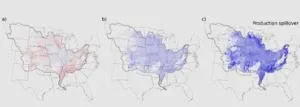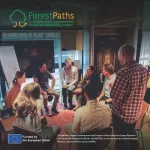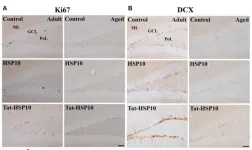WEST LAFAYETTE, Ind. — A climate policy that raises the price of carbon-intensive products across the entire U.S. economy would yield a side benefit of reducing nitrate groundwater contamination throughout the Mississippi River Basin.
The Gulf of Mexico, an important U.S. fishery, also would see modest benefits from the nitrate reductions. These were among the conclusions of a recent study published in the Proceedings of the National Academy of Sciences (PNAS).
The study, led by four early career researchers, three of them from Purdue University, combined four scientific models to simulate how different aspects of climate policy, agricultural economics and the environment would interact. A major feature of the study traced how nitrogen that humans have converted into other forms, called reactive nitrogen, flows through the environment.
“Food production is generating a lot of the reactive nitrogen. Some comes from energy as well,” said study co-author Thomas Hertel, Distinguished Professor of Agricultural Economics at Purdue. “This is a big problem. The reactive nitrogen ends up in rural groundwater. Some of it ends up in the atmosphere. And of course, it ends up in the streams and eventually the Gulf of Mexico.”
Excessive fertilizer use creates a growing number of water-quality concerns, said Shan Zuidema, a research scientist at the University of New Hampshire’s Earth Systems Research Center. “Our models showed that with this climate policy, U.S. carbon emissions could significantly decline, which would translate into about a 3% to 4% reduction of the Gulf of Mexico dead zone in an average year.”
One of the study’s four linked models analyzed various issues related to climate change economics. Another model linked local policies to national and international agriculture prices, land use and the environment. A third produced an estimate of nitrate leaching in the entire Mississippi River Basin based on changes in fertilization rates and land cover. The fourth simulated vertical water exchange between the ground and atmosphere and horizontal transport through runoff and stream networks.
Central to the study was the “nitrogen cascade” concept that the University of Virginia’s James Galloway and his co-authors published in 2003. The concept states that a single nitrogen atom may trigger a cascade of effects in the atmosphere, terrestrial ecosystems, freshwater and marine systems, and on human health.
The PNAS study documented how much nitrogen gets harvested with the remainder getting put into the environment.
Galloway, UVA’s Sidman P. Poole Professor Emeritus of Environmental Sciences, who was not a co-author of the PNAS study, noted that for more than 100 years, an abundant supply of nitrogen has fueled agricultural production.
“Tracking these nitrogen losses, and trying to mitigate them, requires an approach that links economics, agroecology and hydrology to ensure that actions at one point in the chain do not have unintended consequences at another point.” The PNAS paper “is an excellent example of the type of work that is needed,” Galloway said.
The study included an assessment of policy outcomes that assigned the social cost of carbon to estimates ranging from $51 to $152 per ton of carbon dioxide equivalents.
“Fertilizer is most affected because ammonia fertilizer is largely converted natural gas,” Hertel said. The highest carbon price in the models reduced U.S. carbon emission by almost 50%. Coupled with an increase in nitrogen fertilizer prices, this reduced fertilizer applications by about 15% for corn production across the Mississippi River Basin.
The team also considered a scenario that restored wetlands in the central U.S. Corn Belt without a climate policy. The farmers in the area grew less corn and applied less fertilizer. But that prompted increased fertilizer applications in the untreated regions, resulting in negative spillover.
“It seems like every environmental policy we look at has spillovers. They haven’t been considered before, but when you think about the economics and what we call market-mediated spillovers, they’re pervasive,” said Hertel, who founded and is executive director of Purdue’s Global Trade Analysis Project (GTAP). Hertel and co-authors include a discussion of spillovers in a recent special issue of Environmental Research Letters that focuses on global-to-local-to-global sustainability analysis challenges.
The PNAS study looked only at carbon pricing and wetlands, but many other food system interventions lend themselves to similar analyses, including how a change in our diets could affect the nitrogen cascade. “How about reducing food waste, or reducing ethanol production? Or improving nitrogen use efficiency?” Hertel asked.
In addition to Hertel, the Purdue co-authors are: Jing Liu, research economist in agricultural economics;Maksym Chepeliev, principal research economist at GTAP; David Johnson, associate professor of industrial engineering and political science; and Uris Baldos, research associate professor of agricultural economics.
Writer: Steve Koppes
END
National policy aimed at reducing U.S. greenhouse gases also would improve water quality
Sophisticated interdisciplinary study scrutinizes impact of multiple scenarios
2023-12-13
(Press-News.org)
ELSE PRESS RELEASES FROM THIS DATE:
Twenty-year study confirms California forests are healthier when burned — or thinned
2023-12-13
Berkeley — A 20-year experiment in the Sierra Nevada confirms that different forest management techniques — prescribed burning, restoration thinning or a combination of both — are effective at reducing the risk of catastrophic wildfire in California.
These treatments also improve forest health, making trees more resilient to stressors like drought and bark beetles, and they do not negatively impact plant or wildlife biodiversity within individual tree stands, the research found. The findings of the experiment, called the Fire Surrogate Study, were published today in the journal Ecological Applications.
“The research ...
Caregiving can be stressful, but it could also lower risk of depression
2023-12-12
Becoming a caregiver to an aging parent or spouse can be stressful, but a new study from a researcher at The University of Texas at Austin is questioning the idea that family caregiving is also a risk factor for depression.
The study, published in the journal Advances in Life Course Research, found that depression in adult caregivers is mostly driven by having a loved one experiencing serious health problems, while becoming a caregiver is associated with fewer symptoms of depression.
“Decades of research on this topic indicate that there are positive and negative aspects to being a caregiver,” said Sae Hwang Han, ...
UCF researcher discovers new technique for photon detection
2023-12-12
University of Central Florida researcher Debashis Chanda, a professor at the NanoScience Technology Center, has developed a new technique to detect photons — elementary particles that span from visible light to radio frequencies and are instrumental in carrying cellular communication.
The advancement could lead to more precise and efficient technologies in various fields, from improving medical imaging and communication systems to enhancing scientific research and even potentially bolstering security measures.
Photon detection has typically relied on change/modulation of voltage or ...
Fat flies live longer on a diet at any age
2023-12-12
Old, obese flies get healthier and live longer if put on a diet, University of Connecticut researchers report on Dec. 8 in PNAS. If the effect holds true for humans, it would mean it’s never too late for obese people to improve their health with diet.
For way too many of us, eating too much goes along with getting old and a tendency to be obese. Different health organizations define obesity differently, but all agree it means having too much body fat, and is associated with a host of diseases related to metabolism including heart disease and diabetes. Many animal studies have shown that eating less—meaning sharply ...
European Policy Lab gathers stakeholders to map forest policy opportunities and barriers
2023-12-12
ForestPaths’ first Policy Lab convened stakeholders in Helsinki, Finland, on 27-29 September 2023. Nineteen carefully selected participants with diverse expertise – including research, policy, governance, civil society, value chain professionals, and forestry practitioners – engaged in discussions on forest-based policymaking and modelling related to climate change and biodiversity.
Tasked with considering policy actions given different timescales, governance paradigms, enablers, and barriers, participants contributed ...
Tat-heat shock protein 10 ameliorates age-related phenotypes in the hippocampus
2023-12-12
“Mitochondrial dysfunction is a major cellular change observed in the hippocampus during aging.”
BUFFALO, NY- December 12, 2023 – A new research paper was published in Aging (listed by MEDLINE/PubMed as "Aging (Albany NY)" and "Aging-US" by Web of Science) Volume 15, Issue 22, entitled, “Tat-heat shock protein 10 ameliorates age-related phenotypes by facilitating neuronal plasticity and reducing age-related genes in the hippocampus.”
In this new study, researchers Hyo Young Jung, Hyun Jung Kwon, Kyu ...
MIT researchers observe a hallmark quantum behavior in bouncing droplets
2023-12-12
In our everyday classical world, what you see is what you get. A ball is just a ball, and when lobbed through the air, its trajectory is straightforward and clear. But if that ball were shrunk to the size of an atom or smaller, its behavior would shift into a quantum, fuzzy reality. The ball would exist as not just a physical particle but also a wave of possible particle states. And this wave-particle duality can give rise to some weird and sneaky phenomena.
One of the stranger prospects comes from a thought experiment known as the “quantum bomb tester.” The experiment proposes that a quantum particle, such ...
Smoking causes brain shrinkage
2023-12-12
Smoking shrinks the brain, according to a study by researchers at Washington University School of Medicine in St. Louis. The good news is that quitting smoking prevents further loss of brain tissue — but still, stopping smoking doesn’t restore the brain to its original size. Since people’s brains naturally lose volume with age, smoking effectively causes the brain to age prematurely, the researchers said.
The findings, published in Biological Psychiatry: Global Open Science, help explain why smokers are at high risk of age-related cognitive decline and Alzheimer’s disease.
“Up until recently, scientists have overlooked ...
Mammogram rates increase when patients schedule themselves
2023-12-12
PHILADELPHIA— Having the ability to self-schedule mammograms was associated with a 15 percentage point increase following through with getting the screening, according to research from the Perelman School of Medicine at the University of Pennsylvania. The paper was published today in the American Journal of Preventive Medicine.
“Self-scheduling helps make the path to mammogram completion a little smoother, where you don’t have to find the time to call a scheduling line, wait on hold, or go back and forth trying to find an appointment that works for your schedule,” said the study’s lead author, Kimberly Waddell, ...
Protein study could one day advance Parkinson’s, breast cancer care
2023-12-12
PORTLAND, Oregon -- New research from Oregon Health & Science University could one day lead to therapies that prevent or treat diseases and infections tied to a protein that’s found in all human cells.
A study published today in the journal Molecular Cell describes how the protein ubiquitin is modified during a bacterial infection. The study details the steps taken to create a form of the protein known as lysine 6 polyubiquitin, where a long chain of ubiquitin molecules are linked through ...
LAST 30 PRESS RELEASES:
Children with poor oral health more often develop cardiovascular disease as adults
GLP-1 drugs associated with reduced need for emergency care for migraine
New knowledge on heritability paves the way for better treatment of people with chronic inflammatory bowel disease
Under the Lens: Microbiologists Nicola Holden and Gil Domingue weigh in on the raw milk debate
Science reveals why you can’t resist a snack – even when you’re full
Kidney cancer study finds belzutifan plus pembrolizumab post-surgery helps patients at high risk for relapse stay cancer-free longer
Alkali cation effects in electrochemical carbon dioxide reduction
Test platforms for charging wireless cars now fit on a bench
$3 million NIH grant funds national study of Medicare Advantage’s benefit expansion into social supports
Amplified Sciences achieves CAP accreditation for cutting-edge diagnostic lab
Fred Hutch announces 12 recipients of the annual Harold M. Weintraub Graduate Student Award
Native forest litter helps rebuild soil life in post-mining landscapes
Mountain soils in arid regions may emit more greenhouse gas as climate shifts, new study finds
Pairing biochar with other soil amendments could unlock stronger gains in soil health
Why do we get a skip in our step when we’re happy? Thank dopamine
UC Irvine scientists uncover cellular mechanism behind muscle repair
Platform to map living brain noninvasively takes next big step
Stress-testing the Cascadia Subduction Zone reveals variability that could impact how earthquakes spread
We may be underestimating the true carbon cost of northern wildfires
Blood test predicts which bladder cancer patients may safely skip surgery
Kennesaw State's Vijay Anand honored as National Academy of Inventors Senior Member
Recovery from whaling reveals the role of age in Humpback reproduction
Can the canny tick help prevent disease like MS and cancer?
Newcomer children show lower rates of emergency department use for non‑urgent conditions, study finds
Cognitive and neuropsychiatric function in former American football players
From trash to climate tech: rubber gloves find new life as carbon capturers materials
A step towards needed treatments for hantaviruses in new molecular map
Boys are more motivated, while girls are more compassionate?
Study identifies opposing roles for IL6 and IL6R in long-term mortality
AI accurately spots medical disorder from privacy-conscious hand images
[Press-News.org] National policy aimed at reducing U.S. greenhouse gases also would improve water qualitySophisticated interdisciplinary study scrutinizes impact of multiple scenarios






